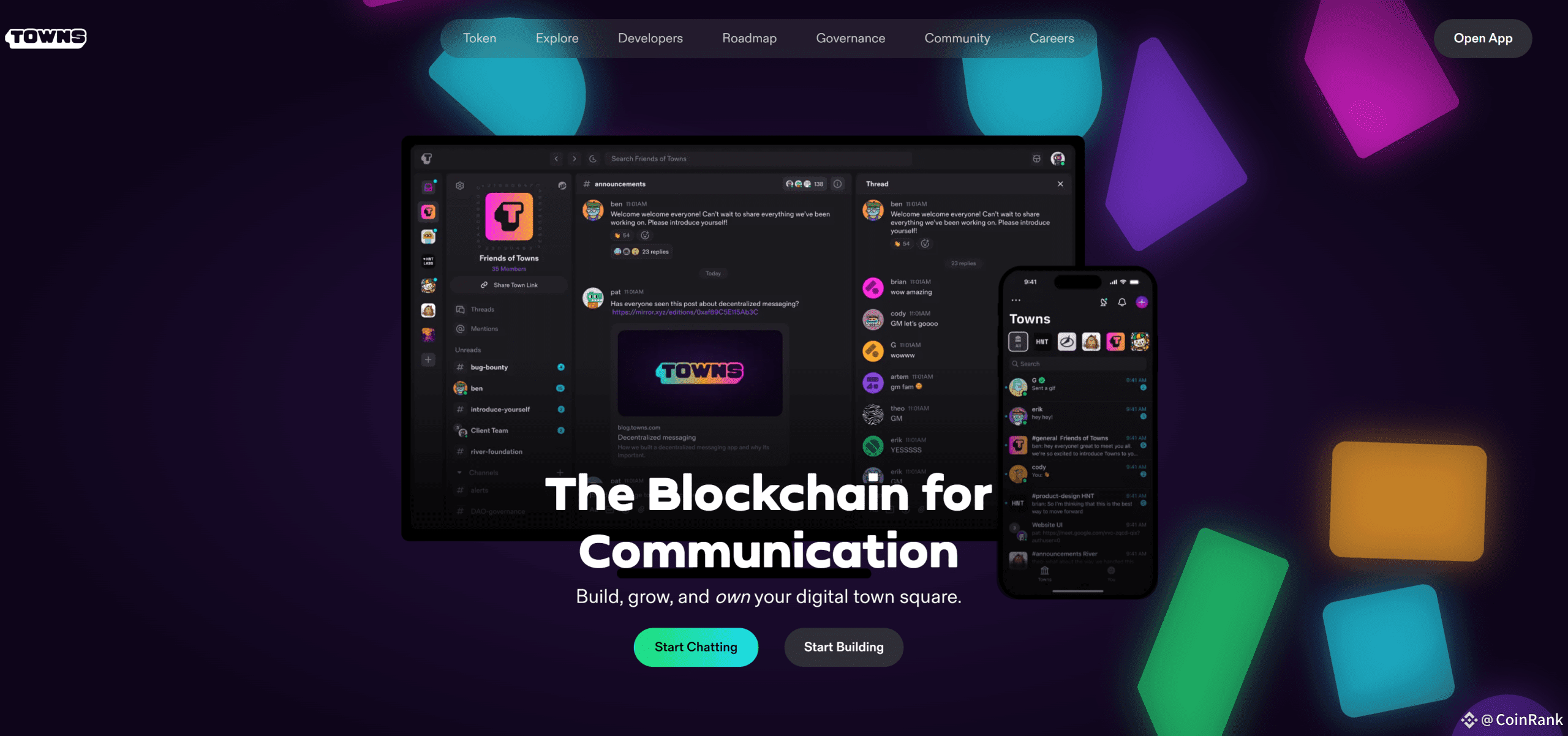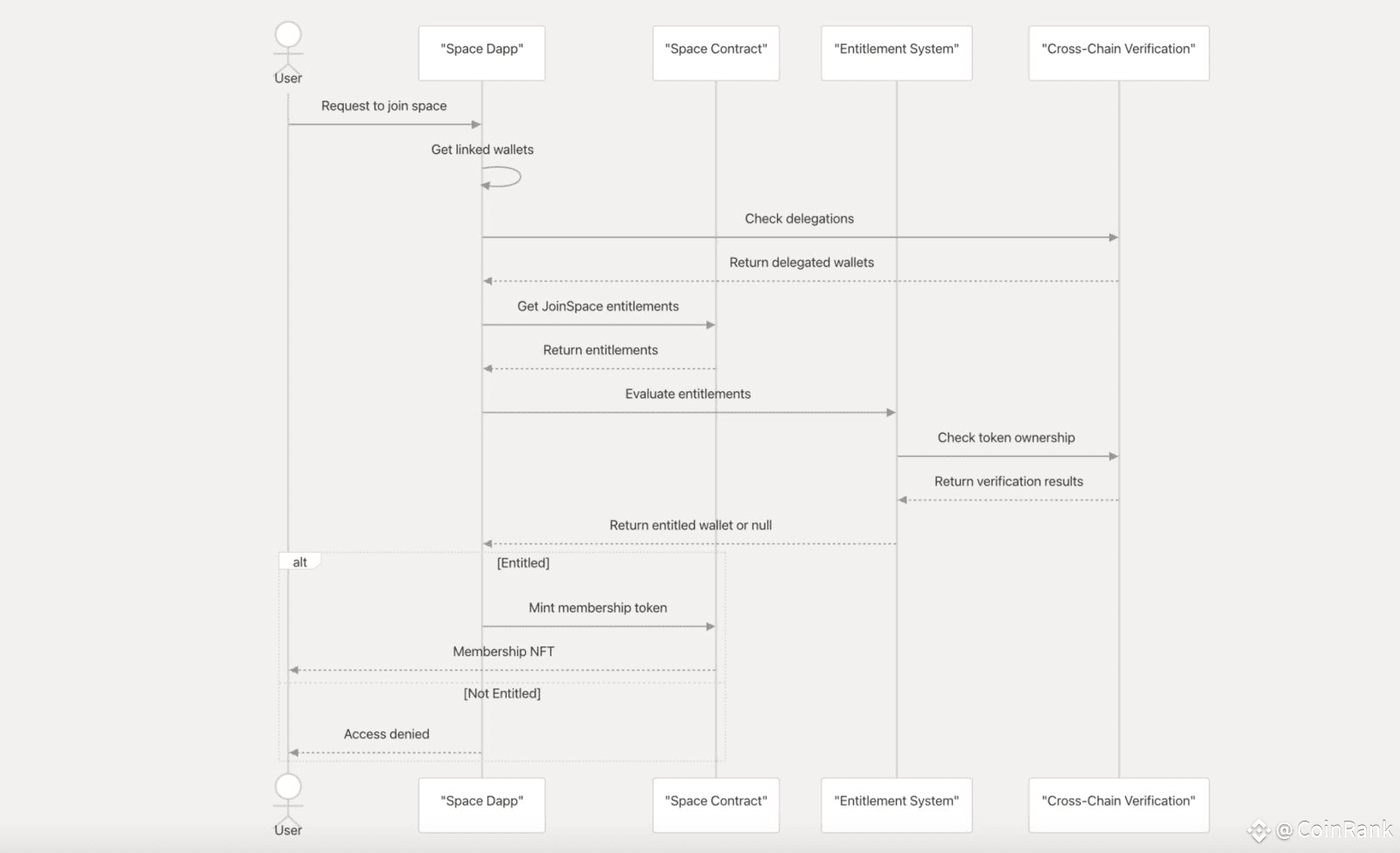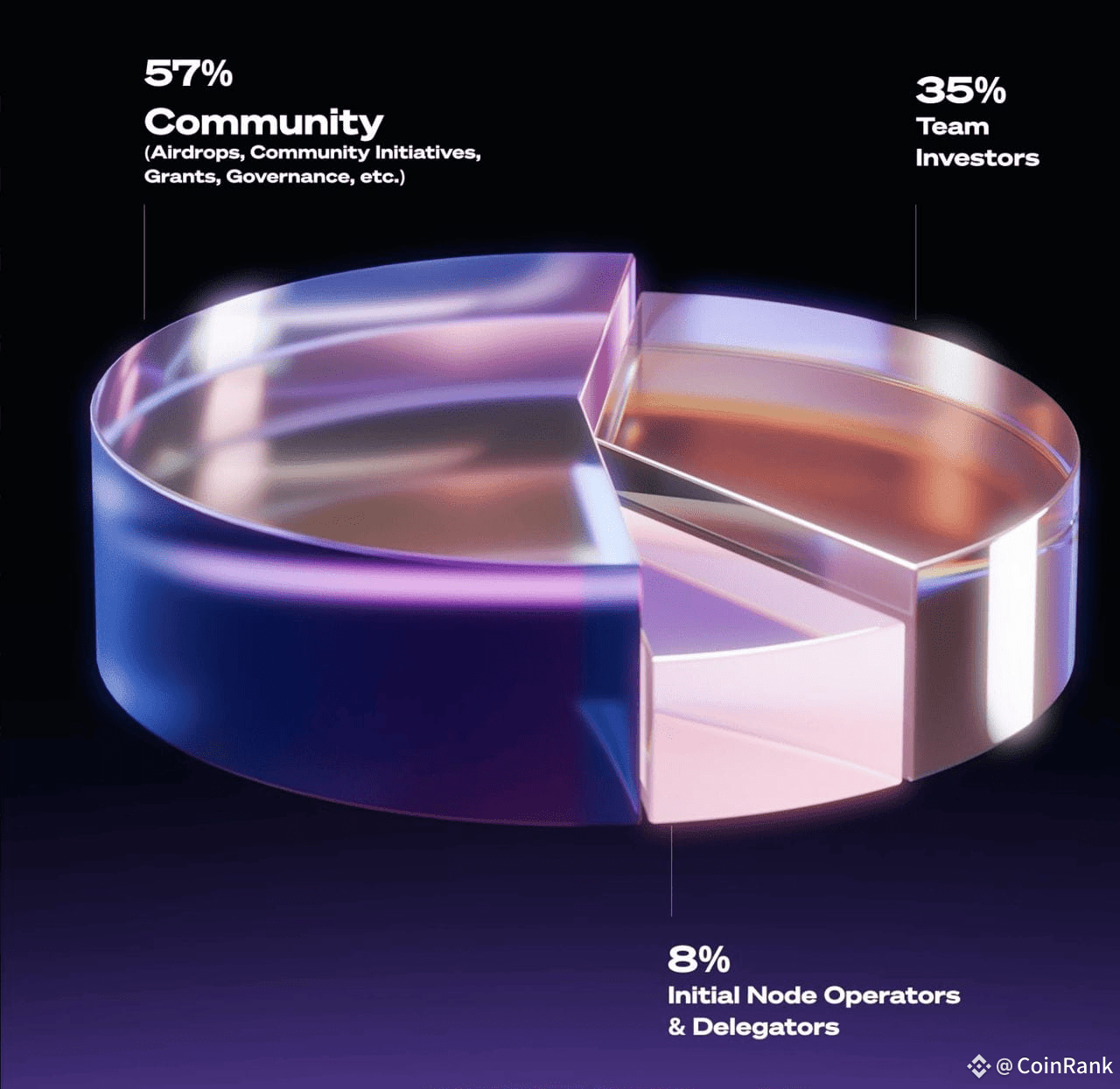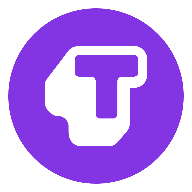Towns combines on-chain governance, token-gated access, and encrypted messaging to create secure, ownable community spaces in Web3.
The $TOWNS powers staking, governance, and premium features, with a flexible delegation model to balance network security and participation.
Future growth hinges on scalability, user experience, and adoption, while facing competition from established platforms like Discord and Telegram.
Towns (TOWNS) is a decentralized messaging platform on Base, offering token-gated spaces, DAO governance, and on-chain privacy to empower Web3 communities.
WHAT IS TOWNS?
Towns is an open messaging system built on the Base network, accessible to everyone. It integrates an EVM-compatible Layer 2 blockchain with decentralized off-chain relay nodes and smart contracts. Unlike traditional centralized platforms, Towns enables users and communities to create programmable, ownable “spaces” — encrypted chat environments managed directly by smart contracts on Base.

🔍 Key features of Towns include:
End-to-end encryption to ensure message privacy and security.
Token-gated access using ERC-20 tokens, NFTs, or wallet-based memberships.
On-chain membership systems that support paid subscriptions and reputation-based access control.
On-chain social graph and governance for transparent moderation and structured community management.
Today, Towns hosts millions of active “spaces,” over 1.6 million members, and has generated 9,300 ETH in protocol revenue, making it an emerging force in the Web3 social space. Its architecture empowers communities to directly monetize access while retaining full governance autonomy — capabilities rarely seen on traditional centralized platforms.
>>> More to read: What is LayerZero & ZRO? How It Works
HOW TOWNS WORKS
Towns is a decentralized system designed for online communication, leveraging the Base Layer 2 network to support smart contract–powered communities.
With Towns, users can create programmable “Spaces” — online groups whose access rights, moderation rules, and governance are enforced directly through on-chain code. These Spaces operate through a dual-layer setup: Ethereum smart contracts handle permissions, payments, and governance, while actual message delivery is processed off-chain to ensure fast response times. This approach gives users full control and ownership without sacrificing speed.

Access to a Space may require holding specific tokens or NFTs. Communities can charge recurring fees, set up voting systems, or implement custom moderation policies. The system is powered by the TOWNS token, which supports access control, voting, staking rewards, and overall protocol health. For paid Spaces, a portion of collected fees is used to buy and burn TOWNS tokens, helping manage supply. Developers can also integrate Towns’ SDK into any Web3 product — such as DAOs, NFT platforms, and more — to embed chat functionality.
Compared with platforms like Discord or Telegram, where data storage is centralized and moderation is handled by the platform, Towns moves these functions entirely on-chain. Rules are encoded in smart contracts rather than dictated by a company. The system is built to safeguard privacy, reduce censorship, and return true ownership to the community. All messages are encrypted, and every function is executed with cryptographic guarantees.
>>> More to read: What is Base App? A Complete Beginner’s Guide
TOWNS DAO GOVERNANCE
The Towns DAO (Decentralized Autonomous Organization) oversees the overall management and operations of the Towns project. It brings together key stakeholders — including users, node operators, Space owners, and core contributors — to make critical decisions shaping the platform’s future.
✏️ Responsibilities of the Towns DAO include:
Voting on the core development roadmap.
Managing technical upgrades and treasury allocations.
Supporting the ongoing development and growth of the protocol.
Through a multi-layered framework spanning protocol, network, and application levels — combined with DAO-based governance — Towns delivers a secure, customizable, and fully Web3-integrated decentralized communication platform. More than just a messaging tool, it enables communities to truly own, govern, and monetize their digital spaces.
>>> More to read: Towns Project Analysis: The Rise and Fall of Community Trust
WHAT IS $TOWNS?
The TOWNS token is the core economic engine of the Towns ecosystem. Beyond staking for rewards, TOWNS unlocks exclusive platform features, enables participation in governance, and drives the project’s long-term growth.
Token delegation to node operators secures the network. Operators set commission rates, while the remaining rewards are distributed proportionally to delegators every two weeks. A 30-day unbonding period applies after initiating withdrawals, allowing operators to safely rebalance the network.
When Space owners accumulate enough delegated tokens, they can unlock premium features — such as extended member retention or complimentary memberships. Direct delegation to node operators transfers voting power to them, whereas delegations to Space addresses retain the voting rights within that Space. This flexible model balances incentives for both network security and governance engagement.
🪙 TOWNS Tokenomics
Token Name: Towns Protocol
Symbol: TOWNS
Total Supply: 10,000,000,000 TOWNS
TOWNS is an ERC-20 token launched on Ethereum mainnet with a fixed initial supply of 10 billion units. Starting in the second year, it carries an annual inflation rate of 8%, decreasing linearly to 2% over 20 years. Any change to inflation must be approved via DAO governance. Newly minted tokens are bridged to Base through the Base Bridge before entering the reward distribution contracts.

➤ Token Distribution:
Community: 57% (airdrop, grants, and ecosystem growth)
Developers & Investors: 35% (1-year lockup, subject to vesting)
Delegators & Node Operators: 8% (to bootstrap decentralized infrastructure)
>>> More to read: What is ZORA? A Complete Guide
TOWNS FUTURE OUTLOOK
The future of Towns will largely hinge on the successful execution of its technical roadmap, particularly in scalability, user experience, and security. To attract a broader audience, the protocol must ensure seamless performance and deliver an intuitive, user-friendly interface. The role of the TOWNS token will also be critical — whether as a governance token, a payment method for premium features, or an incentive for user participation.
Integration with other Web3 verticals, such as decentralized finance (DeFi) or metaverse platforms, could significantly expand the ecosystem’s reach and utility.
That said, Towns faces notable challenges. The platform will need to overcome entrenched habits, as many crypto communities are deeply accustomed to Discord & Telegram. Additionally, crypto market volatility could impact TOWNS price stability. Investors should closely track metrics such as protocol adoption, user growth, and the execution capability of the development team.
Messaging → trading → tipping → coordination.
Towns is the most composable group chat on the internet.
If you’re building a community, you should be earning too. pic.twitter.com/Y6DqVesuGo
— Towns App (@townsxyz) July 30, 2025
In summary, the outlook for Towns (TOWNS) depends on its ability to turn its unique on-chain group chat model into broad user adoption and a sustainable ecosystem. If the team continues to innovate while addressing both technical and market hurdles, Towns could secure a strong position in the Web3 social landscape.
ꚰ CoinRank x Bitget – Sign up & Trade!
Looking for the latest scoop and cool insights from CoinRank? Hit up our Twitter and stay in the loop with all our fresh stories!
〈What is TOWNS? Everything You Need to Know〉這篇文章最早發佈於《CoinRank》。




